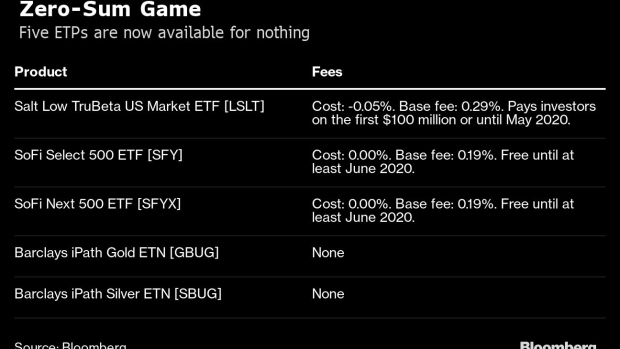Nov 21, 2019
Farewell, Fees? How Zero-Cost Investing Caught On
, Bloomberg News

(Bloomberg) -- Investors have gotten used to paying lower fees to buy and hold stocks and funds. But the trend entered a whole new phase this past year as U.S. brokers and fund managers began offering stock trades and investments at zero cost. Any suspicion that zero-cost investing was a gimmick was quashed in October when industry titan Charles Schwab Corp. announced plans to eliminate commissions for U.S. stocks, exchange-traded funds and options. Its competitors soon followed suit.
1. How did it come to this?
It all began when the U.S. Securities Acts Amendments of 1975 ended fixed-trade commissions. Some brokerages took that opportunity to increase their fees, but a former newsletter writer named Charles Schwab charged a comparatively affordable $70 a trade. The discount brokerage business was born, and as technology got better and competition grew more fierce, the common price points kept falling — to about $13 a trade in 2005, then $5 by this year.
2. How can stock brokers survive without commissions?
They draw revenue in other ways. Most importantly, they invest or loan out the money they’re holding for clients when it’s not in play in the market, with the aim of making more than the paltry interest they pay on those funds. Brokers also get fees for sending their customers’ buy and sell orders to computerized trading firms. They make money by catering to investment advisers, loaning customers cash to buy stocks and lending out securities to short sellers hoping to profit on a decline in prices. Offering free trades allows brokers to draw new clients who may want services their company still charges for, such as investment advice.
3. How can funds survive without charging fees?
Funds lack the variety of revenue streams that brokers have, which might be cause for concern. Savings achieved in the legal department could hurt investors in the event of a lawsuit. Other savings could be made by constructing indexes in-house or licensing lower-cost alternatives, hiring second-tier custodians, or limiting any sales presence or advertising budget. These economies could result in damaging oversights, or increase the likelihood of the fund closing. New York-based Salt Financial, a relatively new provider of exchange-traded funds that actually pays investors to buy its newest product, keeps its transaction costs low by tracking an index of less volatile companies -- meaning it swaps out just two or three investments per quarter.
--With assistance from Rachel Evans.
To contact the reporters on this story: Claire Ballentine in New York at cballentine@bloomberg.net;Annie Massa in New York at amassa12@bloomberg.net
To contact the editors responsible for this story: Sam Mamudi at smamudi@bloomberg.net, Grant Clark, Alan Mirabella
©2019 Bloomberg L.P.